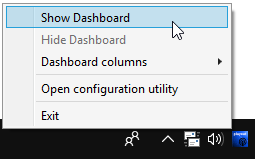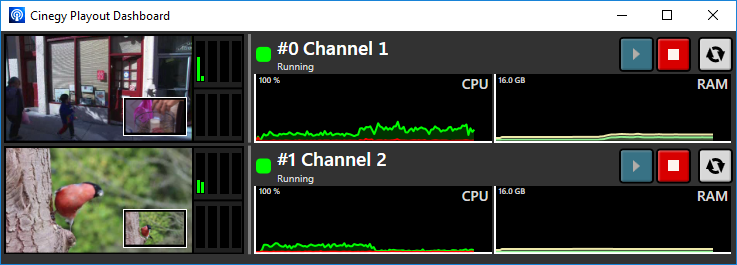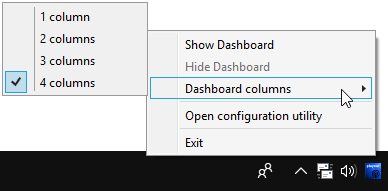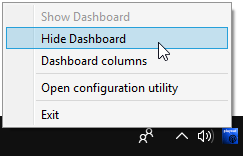Automatic Launch
Reading time ~2 minutes
Cinegy Playout is responsible for sending video and animated graphics on air. By default, Cinegy Playout is started automatically on the system startup. The engine also restarts automatically in case of failure.
|
When started, the Cinegy Playout icon is displayed in the notification area of the taskbar. |
To see and control the status of all engine instances, right-click the Cinegy Playout icon in the taskbar and select the "Show dashboard" command:

The following Cinegy Playout Dashboard window will appear. This is a default dashboard view with no Cinegy Playout instances started:

In the left-hand part of the dashboard, you can see the control monitors of configured Cinegy Playout instances and their individual audio level indicators. The thumbnail of the first frame of the next cued item is displayed in the bottom right corner of the monitor.
In the right-hand part of the dashboard the instance name and status are displayed, as well as CPU and RAM diagrams. The following set of controls can be used to manage each engine instance:
|
Press the "Start" button to start the specified instance broadcasting. By default, the control monitor will be filled with blue color meaning that the engine is on air but there is no media material for the broadcast yet. It is possible to customize the filling color in the instance configuration file. |

|
Press the "Stop" button to stop the specified instance broadcasting. |
|
Press the "Restart" button to restart the specified instance broadcasting. |
The dashboard panel with several configured and started engines looks as follows:

The engine status is indicated with the following color coding:
|
The green indicator shows that the engine is connected and running. |
|
The red indicator shows that a crash has occurred during playout with automatic restart. |
|
The gray indicator shows that the engine is stopped. |
|
The blinking red indicator appears when the engine status is "Failed" (the specified engine has not been properly configured or some license is missing). |
It is possible to adjust the dashboard view by changing the number of columns for instances to be displayed in the dashboard window. To do this, right-click the Cinegy Playout icon in the taskbar and choose the required number of columns from the "Dashboard columns" submenu:

To hide the dashboard, press the "X" button on the Cinegy Playout Dashboard window or right-click the Cinegy Playout icon in the taskbar and select the "Hide dashboard" command:

To exit the application, use the "Exit" command. To launch the engine again, run the PlayoutDashboard.exe file from your Cinegy Playout installation folder.





